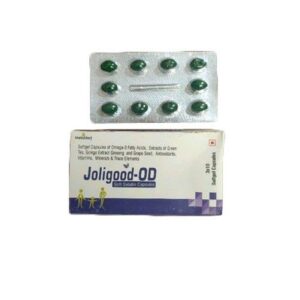VITAMIN + OMEGA-3 FATTY ACIDS + WHEAT GERM OIL
Vitamin: Drug: Vitamin
Use: Vitamins are essential organic compounds that are required for various bodily functions and play a crucial role in maintaining good health. They are essential nutrients that cannot be synthesized in sufficient quantities by the body and must be obtained through diet or supplementation. They are important for normal functioning of various biological processes, including metabolism, growth, and regulation of bodily functions.
Mechanism of Action: Each vitamin has a unique mechanism of action, but generally, they act as coenzymes or precursors for coenzymes. Coenzymes are essential for the proper functioning of enzymes, which are proteins that facilitate chemical reactions in the body. Vitamins can also have antioxidant properties, protecting cells from damage caused by free radicals.
Dose: The recommended daily dose of vitamins varies depending on age, sex, and specific needs. The recommended doses are often provided as daily dietary reference intakes (DRIs) or recommended dietary allowances (RDAs). It is important to consult with healthcare professionals or refer to reliable sources to determine the appropriate dosage for specific vitamins.
Side Effects: Generally, when taken within the recommended dosage, vitamins have a low risk of adverse effects. However, taking excessive amounts (megadoses) of certain vitamins can lead to toxicity and adverse effects. For example, excessive vitamin D intake can cause hypercalcemia, while excessive vitamin C intake can lead to gastrointestinal disturbances like diarrhea. It is important to follow the recommended dosage guidelines and consult a healthcare professional if any concerning symptoms occur.
It is worth noting that there are various types of vitamins (A, B, C, D, E, K), each with their own specific functions, sources, and potential side effects. This description provides a general overview, and further research or consultation with healthcare professionals is advisable for specific information about individual vitamins.
Omega-3 Fatty Acids: Omega-3 fatty acids are a type of polyunsaturated fats that are essential for optimal health. They are mainly derived from fatty fish such as salmon, mackerel, and sardines, as well as from certain plant sources like flaxseed and walnuts. Omega-3 fatty acids are available as a dietary supplement, commonly known as fish oil capsules.
Use:
The primary use of omega-3 fatty acids is to promote cardiovascular health. They are known to reduce triglyceride levels in the blood, lower blood pressure, and prevent blood clot formation, thus reducing the risk of heart disease and stroke. Omega-3 fatty acids may also have beneficial effects on brain health, reducing the risk of cognitive decline and improving mood disorders such as depression and anxiety. Additionally, they have anti-inflammatory properties and may help alleviate symptoms of conditions like rheumatoid arthritis.
Mechanism of Action:
Omega-3 fatty acids work by modifying the production of certain signaling molecules in the body, including eicosanoids. These molecules play a role in regulating inflammation, blood clotting, and blood vessel constriction. By altering their production, omega-3 fatty acids help reduce inflammation, prevent excessive blood clotting, and promote blood vessel dilation, thus improving cardiovascular health.
Dose:
The recommended daily dose of omega-3 fatty acids varies depending on the individual’s health condition. However, the American Heart Association recommends consuming 1-2 servings of oily fish per week (each serving being approximately 3.5 ounces) or taking omega-3 supplements containing 500-1000 mg of EPA and DHA combined daily. It is always best to consult with a healthcare professional for personalized dosing recommendations.
Side Effects:
Omega-3 fatty acids are generally considered safe and well-tolerated. However, some people may experience mild side effects, including fishy aftertaste, burping, or gastrointestinal disturbances. Taking high doses of omega-3 fatty acids may also increase the risk of bleeding, especially in individuals already on blood-thinning medications. Furthermore, individuals with fish or shellfish allergies should exercise caution when taking omega-3 supplements. It is important to note that omega-3 fatty acids should not replace other prescribed medications for cardiovascular diseases without consulting a healthcare professional.
As with any supplement, it is always recommended to consult with a healthcare professional before starting omega-3 fatty acid supplementation, especially if you have underlying medical conditions or are taking other medications.
Wheat Germ Oil: Wheat Germ Oil is a dietary supplement that is extracted from the germ (the embryo) of wheat seeds. It is rich in various nutrients, including vitamin E, fatty acids, proteins, and minerals.
This oil is commonly used as a nutritional supplement to benefit overall health and well-being. It is believed to have numerous benefits, such as promoting healthy hair and skin, boosting the immune system, improving cardiovascular health, and reducing inflammation. It is also known for its antioxidant properties, which can help protect the body from damage caused by free radicals.
The exact mechanism of action of Wheat Germ Oil is not fully understood. However, its high content of vitamin E and essential fatty acids is thought to contribute to its health-promoting effects. Vitamin E is a powerful antioxidant that helps in neutralizing free radicals, while essential fatty acids play a role in maintaining the structure and function of cells.
The recommended dose of Wheat Germ Oil varies depending on the specific product and individual needs. It is typically available as a liquid oil or in capsule form, and the dosage instructions should be followed as mentioned on the packaging or as directed by a healthcare provider.
Side effects of Wheat Germ Oil are generally mild and uncommon. However, some individuals may experience allergic reactions, such as skin irritation or swelling, especially if they have a known allergy to wheat or gluten. Additionally, excessive consumption of Wheat Germ Oil may lead to digestive issues, such as diarrhea or stomach upset.
It is important to note that Wheat Germ Oil may interact with certain medications, such as blood-thinning drugs or anti-platelet medications. Therefore, it is recommended to consult with a healthcare professional before starting any new supplement, especially if you have any underlying health conditions or are taking prescription medications.


